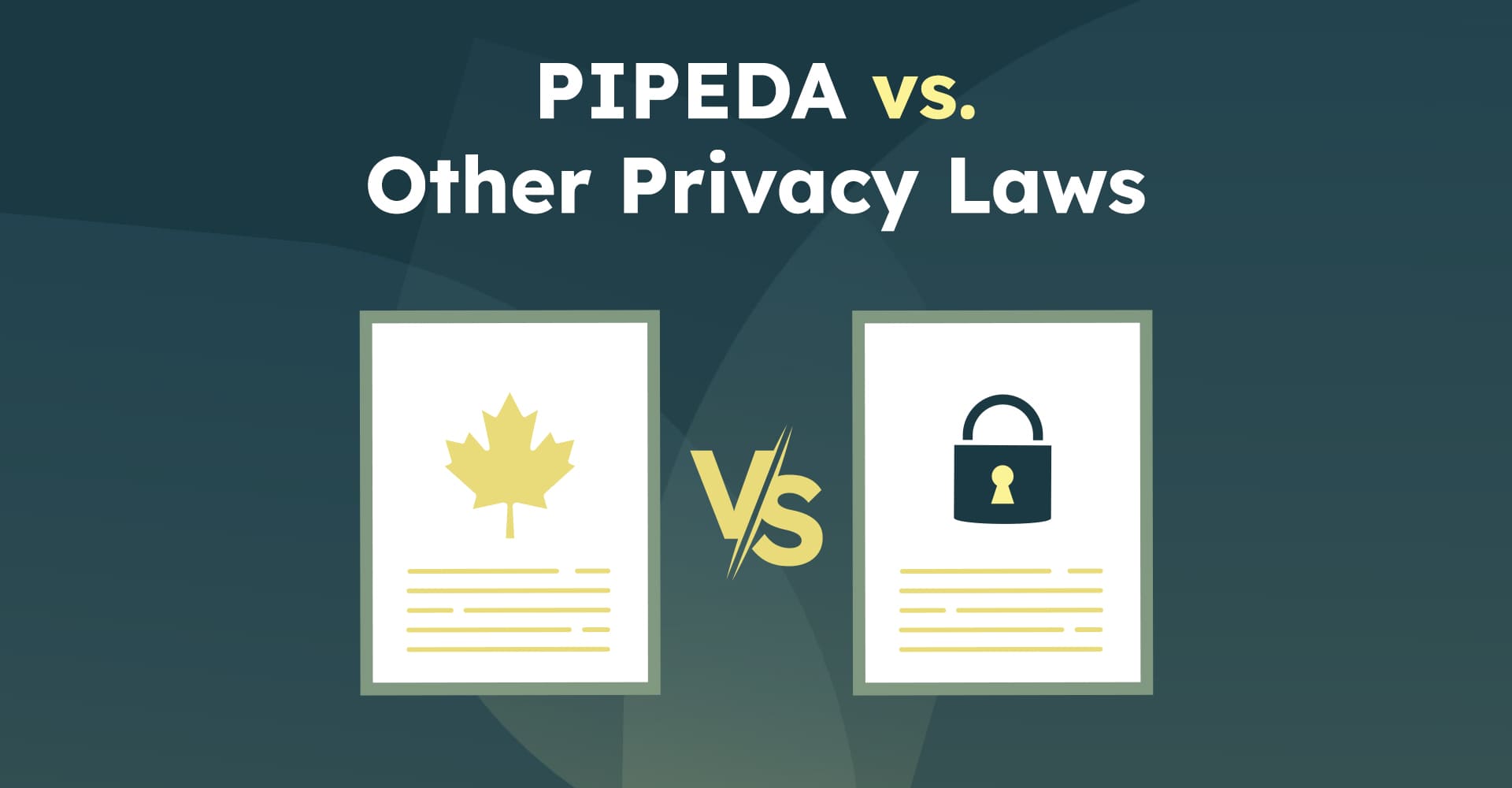PIPEDA vs GDPR, CCPA, LGDPA, and Other Privacy Laws

Table of Contents
With each passing year, more and more data privacy laws go into effect. Their purpose is to protect private consumer information. While there is no single worldwide governing data privacy law, many countries do have their own privacy protection legislation. For instance, citizens of Canada are protected by the Personal Information Protection and Electronic Documents Act, or PIPEDA.
In this article, we'll talk about how PIPEDA differs from other data privacy laws such as GDPR, CCPA, LGDPR, and others and how you may need to tailor your strategy for each.
PIPEDA Versus Other Data Privacy Laws
Many of the principles and guidelines outlined in PIPEDA are similar to those of other data privacy laws throughout the world. However, just because you are compliant in one country doesn’t guarantee you’ll be compliant in another.
Let's take a closer look.
PIPEDA vs The European Union General Data Protection Regulation (GDPR):
The GDPR (General Data Protection Regulation) is a privacy law that applies to organizations operating in the European Union (EU). Like PIPEDA, the GDPR sets out rules for the collection, use, and disclosure of personal information, but it has a broader scope and more stringent requirements than PIPEDA.
The GDPR applies to any organization that processes the personal information of EU citizens, regardless of where the organization is located, and it gives individuals more control over their personal information, including the right to access, correct, and delete their data.
In summary, both PIPEDA and GDPR are privacy laws that regulate the handling of personal information by organizations, but the GDPR has a broader scope and more stringent requirements than PIPEDA.
PIPEDA vs The California Consumer Privacy Act (CCPA):
While multiple states in the US have their own consumer data privacy legislation, the most recognized privacy law is the California Consumer Privacy Act (CCPA). The major difference between the CCPA and PIPEDA is data deletion and portability. The CCPA requires that a business provide consumer data in a readily transferable format upon request.
The CCPA also requires that organizations must delete personal information collected by consumers upon request, and they must make a reasonable effort to reach out to other organizations to which they’ve distributed a consumer’s private information upon their request.
While PIPEDA encourages organizations to follow the example set by the CCPA, there is nothing in the legislation at this time that requires portability or data deletion upon request.
The CCPA also gives California residents greater control over their personal information, including the right to know what personal information is being collected about them, the right to request that their personal information be deleted, and the right to opt-out of the sale of their personal information.
PIPEDA Vs The Lei Geral de Proteção de Dados (LGPD):
The Brazilian LGPD is the latest globally-recognized data privacy law to go into effect, since August 2020.The major difference between the LGPD and PIPEDA is the type of data collected and the basis for data collection.
The LGPD says that any information that helps directly or indirectly identify an individual is defined as private information, which is much broader than the PIPEDA. And there are significantly more restrictions about the purposes for data use, collection, and transfer under the LGPD compared to PIPEDA.
If you are interested in more global privacy laws, some worth researching because of their broad impact on companies include:
- Fair Credit Reporting Act (FCRA)
- Health Insurance Portability and Accountability Act (HIPAA)
- Australia’s Privacy Act of 1988
Understand International Data Privacy Compliance with Enzuzo
As more countries pass data privacy protection legislation, staying compliant with PIPEDA, GDPR, CCPA, LGPD, and other data privacy legislation has become even more difficult. Furthermore, these data privacy laws constantly evolve and grow in greater complexity as companies are forced to handle issues like health information and international data transfers.
An example of the complexity is highlighted here — the GDPR, traditionally viewed as a data privacy law for Europe, is also applicable to citizens outside the EU.
Data privacy and protection laws are not meant to be weapons wielded against businesses. Instead, they should be viewed as a bridge that will help consumers have greater trust in organizations while they instruct businesses and other groups on how they should handle private consumer information. Avoiding punishments for non-compliance is important, but seeking compliance to build your organization's reputation will greatly benefit your company.
Does your organization need help to maintain PIPEDA and privacy law compliance? Then consider using our data privacy compliance software from Enzuzo. Compatible with many web browsers, phone applications, and eCommerce platforms, Enzuzo will ensure global data privacy compliance when you integrate our data privacy and security platform into your business.
Want to learn more? You can contact us or see if we’re a good fit for your organization by booking a demo. Along with ensuring data privacy compliance, our platform helps organizations maintain proper terms of service, EULA, and other essential policies.

Osman Husain
Osman is the content lead at Enzuzo. He has a background in data privacy management via a two-year role at ExpressVPN and extensive freelance work with cybersecurity and blockchain companies. Osman also holds an MBA from the Toronto Metropolitan University.